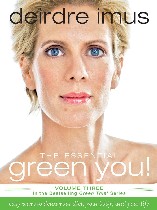

The public's concerns about toxic exposures have primarily been focused on the air we breathe, the water we drink and the food we eat. And for good reason. Studies continue to show how environmental chemical exposures are having a deleterious effect on the health of children and adults alike.
While it goes without saying that we do not want our children breathing polluted air, drinking contaminated water, eating foods sprayed with harmful pesticides or playing with toxic toys, most of us are unaware of dangers posed by chemicals contained in our own personal care products. Most consumers do not understand what the continual use of these products has on our own overall health.
Here's a reality check... the average consumer can use more than two dozen personal care products containing hundreds of chemical ingredients each day. Whether you purchase your personal care products from the local drug store or a high end cosmetic specialty boutique, most of these lotions and potions are filled with unregulated, toxic chemicals. The truth is, these constant small exposures have a much bigger impact on your health and our environment than you might imagine.
As the public becomes more aware of the health effects caused by various toxins, many of us are searching for ways to reduce these exposures.
When I began writing The Essential Green You! my goal was to give consumers an easy, practical guide to help you start to live a healthier lifestyle. As I described in my last article, a logical and important place to start is by making small changes to your diet. Another way to protect your health is by reducing the number of toxic exposures that you unknowingly inflict upon yourself through your personal care product choices.
Personal care products, like deodorant, soap, sunscreen, lip balm, hand lotions, shampoo and conditioners are designed to penetrate -- that's how they are able to do such a good job of cleansing and moisturizing. Many ingredients penetrate all the way down to the cellular level. While these ingredients make some personal care products effective, they also make them dangerous.
I know it's hard to imagine that your favorite makeup, perfume, and personal care products could also be a threat to your health. But walk into any nail and hair salon and take a deep breath and think about what is entering your lungs and what is being applied to your body. As scientists search for the cause of diseases and chronic illness, a pattern continues to emerge. In a growing number of studies, researchers are beginning to link the adverse effects caused by many of the same chemicals found in commonly used personal care products.
Phthalates (dibutyl phthalate, or DBP), for example, are used as a plastisizor to make children's toys soft and pliable. It is also a hormone disruptor. For over 20 years, scientists have known that phthalates could interfere with reproduction and cause birth defects in animal studies.
In a study published in Environmental Health Perspectives (2000), high levels of phthalates were found in 68 percent of blood samples from young girls who began to develop breasts prematurely (before age eight). In another study, published in 2005, researchers found males exposed to phthalates, while in the womb, had an increased risk of impaired testicular function and other genital abnormalities.
Recognizing the potential health risks associated with phthalates, the European Union banned DBP use in cosmetics in 2004. In this country, Congress approved a nationwide ban on phthalates from products used by children under the age of 12. Retail giants Wal-Mart, Toys 'R' Us and Target announced that they will no longer sell children's products that contain phthalates starting this month. Both decisions are scheduled to begin this month.
While these responsible policies will go a long way towards reducing phthalate exposure in young children, the same dangerous chemical can still be found in many cosmetics, nail polishes, shampoos, hair sprays, body lotions and fragrances even though manufacturers often fail to disclose this information on the label. Because of this omission of information, millions of pregnant women and women of childbearing age could be unknowingly exposing their babies to this very dangerous chemical through a variety of personal care products.
The use of parabens and aluminum-based compounds in antiperspirants have been a health concern for years. Parabens, widely used as preservatives, can accumulate in the body and mimic estrogen in the body's cells. In 2004, a study found parabens in 18 of 20 tissue samples from human breast tumors.
Aluminum, a known neurotoxin, can also cause estrogen-like changes in the body. Used in antiperspirants, only a small amount is applied to the skin. However as in most daily use personal care products, daily use results in persistent low-dose exposure. Some scientists suspect the aluminum can bind to estrogen, potentially damaging cell DNA, triggering abnormal growth, which may also increase the risk of developing breast cancer. In another study, researchers suggest the use of antiperspirants containing aluminum can increase the risk of Alzheimer's by 60%.
In all likelihood you already know that lead is a dangerous neurotoxin that can damage a child's developing brain. The EPA had determined that lead is also a respiratory toxin and possibly a human carcinogen and was banned from gasoline and paint years ago.
With all of the notoriety and public knowledge of the dangers associated with lead you wouldn't expect to find lead in your makeup...right? Think again.
While the European Union bans lead from all cosmetics because of concerns that it may impair fertility and cause harm to a fetus in the womb, our FDA allows lead acetate to be used in all cosmetics except those around the eyes. Lead acetate is often added to hair dyes, styling products and dandruff treatments. Lead is also used in some of the most popular lipsticks.
In 2007, a report entitled "A Poison Kiss: The Problem of Lead in Lipstick" was released by the Campaign for Safe Cosmetics. The study found two thirds of the 33 lipstick samples from major department and drug stores contained detectable levels of lead, with half exceeding the FDA's safety limit for lead in candy.
It has been estimated that an average woman may ingest as many as four pounds of lipstick in her lifetime, and more if it is used every day. So while you may be careful to make sure your child's toys are lead-free, you are exposing yourself and then sharing this toxin every time you give your child or partner a lead-laced kiss.
Mercury (thimerosal) is another toxic heavy metal, a known developmental neurotoxin, that is used in some mascaras and eye drops. It is often listed as mercuric oxide, phenyl mercuric acetate, benzoate, bromine, chloride or borate.
In the past few years there has been a growing grassroots movement focused on "greening" personal care products. Formed a few years ago, Teens for Safe Cosmetics , an energetic and committed group of young women from California, began a campaign to help educate their generation about the cancer-causing chemicals used in cosmetics.
"In January of 2003, The European Union banned the use of chemicals that are known or strongly suspected of causing cancer, mutation or birth defects. I believe that if Europe can ban the toxic chemicals, there is no reason why America should continue to this endangerment," said Jessica Assaf, a member of Teens for Safe Cosmetics. "The United States is allowing this billion-dollar industry to put unlimited amounts of chemicals that have been linked to cancer and reproductive harm into personal care products. The cosmetic industry uses more than 5,000 chemicals in its products, in everything from lipstick to lotion to shampoo to deodorant."
These are just a few examples of the harmful ingredients used in personal care products that might be found right in your own bathroom or cosmetic case. And there are many, many more. Ingredients identified as endocrine disruptors, respiratory irritants, toxic to the immune and nervous systems and possible carcinogens are found in many of the most popular cosmetics and personal hygiene products.
It's not only your own personal health at stake. Each time you shower or cleanse your face, you're sending all the ingredients in your shampoo and soap down the drain, and recycling these chemicals back into the environment.
Right now you must be thinking, it's just impossible and too complicated to avoid all of these toxic exposures by making wholesale changes to your personal care routine and too time consuming to figure out what products are truly safe.
Realistically, it is impossible to avoid all toxic chemical exposure and I'm not suggesting you throw out every product in your bathroom cabinet and replace them with expensive alternatives. I also wouldn't suggest you settle for a shampoo that doesn't clean your hair or shaving gel that clogs your razors just because it's "natural."
In the same way you can promote better health by making small simple changes to your diet, choosing one or two reduced or chemical-free personal care products, like your toothpaste and deodorant. This will also help reduce the amount of damaging toxins entering your body. Just like the foods we purchase, there are cleaner, safer alternatives.
At the Skin Deep Cosmetic Safety Database you will find safety ratings for over 40,000 personal care products along with a list of the products' ingredients.
With the New Year ahead, take control of what you put in and on your body. These are things only you can change on the way to becoming a healthier person and The Essential Green You!
------------------------------------
More comprehensive tips on eco-shopping and healthy choices including a list of recommendations, recipes and resources can be found in Deirdre Imus' new book, The Essential Green You!, easy ways to detox your diet, your body, and your life, volume three, in the New York Times best-selling Green This! series.
Deirdre Imus, Founder, President, The Deirdre Imus Environmental Center for Pediatric Oncology at Hackensack University Medical Center, Co-founder, Co-Director of Imus Ranch, a working cattle ranch for kids with cancer.
